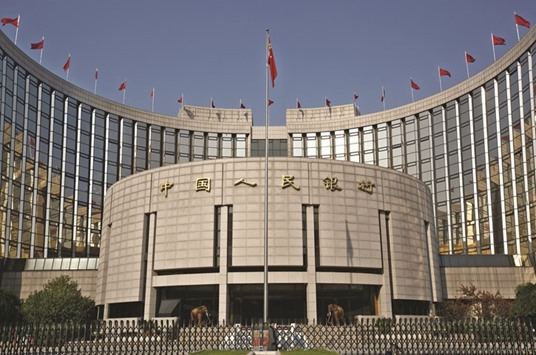Foreign investors who jumped into China’s $6.5tn bond market last month may have bought at the peak.
Overseas holdings of Chinese debt rose 2.4% to 680bn yuan ($105bn) in March, only the second increase in eight months, after the authorities eased restrictions on foreign purchases in the interbank bond market and the yuan rallied against the dollar. Since then, government and corporate securities have tumbled, with the five-year sovereign yield headed for its biggest monthly jump since the aftermath of a cash crunch in mid-2013.
Manulife Asset Management and Fubon Asset Management say investors should steer clear of the nation’s bond market as expectations for further stimulus subside and a two-year rally in China’s debt starts to unwind. Waning foreign interest in bonds would jeopardize government efforts to counter a cash exodus and spur growth through cheap credit.
“In retrospect that wasn’t a good time to buy Chinese bonds,” said James Yip, a fund manager at Shenwan Hongyuan Asset Management (Asia) in Hong Kong. “The correction may continue for a while. Now you should be waiting for a better entry time because the market had risen too much and the whole sentiment isn’t supportive for bonds.”
The abrupt end to China’s debt rally comes after global appetite for Chinese assets showed signs of recovery. The yuan jumped the most since 2010 in March as the dollar fell and the Chinese leadership pledged stability, assuaging concerns that last August’s devaluation would be repeated.
Since falling to a six-year low of 2.47% on April 1, the five-year government yield has increased 29 basis points as data from industrial production to new credit beat estimates, prompting investors to reprice expectations for further easing.
In the credit market, rising defaults are also fueling the biggest selloff in junk debt since the data became available in 2014, while at least 103 Chinese firms postponed or scrapped 117.4bn yuan of planned note sales this month through April 25.
The People’s Bank of China removed quotas for most overseas financial institutions to invest in the interbank bond market in February, after lifting such caps for central banks and sovereign wealth funds last June. Shanghai Clearing House said last week it will start its yuan bond operations for global investors in the city’s free-trade zone soon.
Still, the presence of global asset managers remains small. Foreign investment accounted for just 2.96% of sovereign notes in the interbank market on March 31, ChinaBond data show.
Manulife Asset Management says government bond yields will rise a further 50 basis points.
“The market has come to a point where probably the pricing was too aggressive,” said Paula Chan, Hong Kong-based senior portfolio manager at Manulife Asset, which oversaw about $301bn at the end of 2015. “So the unwinding is happening and we think there’s still more room to go.”
The asset managers at Shenwan Hongyuan and Manulife say they will look to buy onshore bonds when prices have fallen to more reasonable levels. Shenwan Hongyuan’s Yip says the economy is still looking rocky, and the outlook for debt will be better in the second half of the year. Manulife’s Chan said she may buy government bonds with tenors of up to five years when the selling wanes because she expects the PBoC to keep money-market rates stable.
Ben Hsueh, a fund manager at Fubon Asset in Taipei, says Chinese firms’ offshore bonds are more attractive than onshore notes.
“Maybe institutions like central banks have other considerations like the fact that the yuan is now a major trading currency,” Hsueh said. “But for asset managers like us, yields are not that high, and there’s not much room to seek capital gains, so I think even domestic investors would prefer overseas bonds if they had access.”

The People’s Bank of China headquarters is seen in Beijing. The PBoC removed quotas for most overseas financial institutions to invest in the interbank bond market in February, after lifting such caps for central banks and sovereign wealth funds last June.
